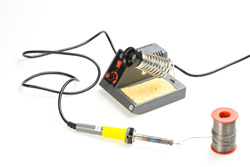Safer technologies for better electronics
The 'Low cost lead-free soldering technology to improve competitiveness of European SME' (Leadout) project helped European small and medium-sized enterprises (SMEs) in the electronics industry to implement lead-free soldering technology. The objective was to increase process yields in the assembly of printed circuit boards (PCBs) and to assist SMEs to become more competitive in the open market. The EU-funded team increased awareness regarding the degree to which SME operations would change with the shift to lead-free solders, and offered technical support on issues related to materials replacement. They established process quality standards for timely conversion to the new technology, reduced defect rates and maximised product reliability. An innovative monitoring and analysis process was applied for receiving industry feedback with regard to the implementation of training schemes, compliance with environmental requirements and adoption of technological proposals. Partner SMEs built a series of nine commercial products for soldering trials and developed numerous assembly process methodologies. An electronic image database, designed to help in the identification of likely differences between the joint materials, included data on materials and processing for users' searches of factor-specific combinations. Targeted assessment, testing and analyses of the reliability of lead-free soldered assemblies did not reveal any significant difference between conventional and lead-free solder alloy performances for surface mount joints. In case of through-hole joints, testing of the proposed solders showed better performance results compared to existing materials. Team members also performed an environmental assessment to measure the impact of lead-free solders as opposed to existing alternatives. Study results indicated that, in terms of emissions to air, soil and water, the proposed innovations were more and that eliminating lead was better for the health of workers. Leadout organised training courses, with emphasis on lead-free technology, to share information on PCB manufacturing. Dissemination activities included seminars, meetings, workshops and trade fairs, with information also being shared through the project website. Project efforts contributed to improved health and safety awareness as well as pollution prevention, given that the new technology is in compliance with relevant European directives.







